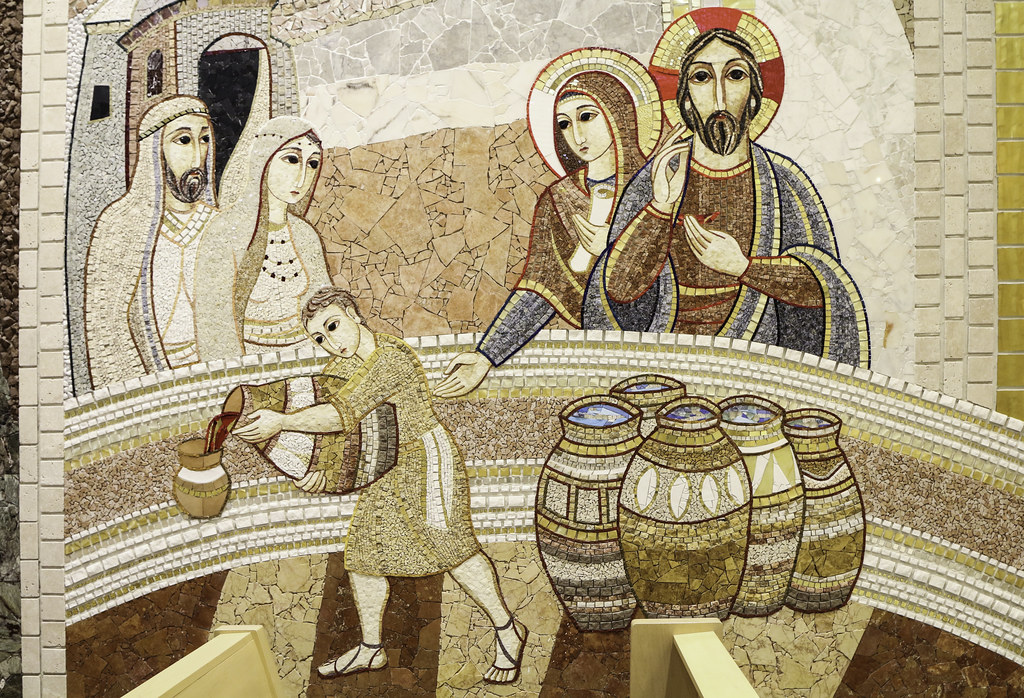 2nd Sunday in Ordinary Time C
2nd Sunday in Ordinary Time C
Readings: Isaiah 62:1‑5 1 Corinthians 12:4‑11 John 2:1‑12
During these first Sundays of Ordinary Time, the Church rejoices in Jesus' presence which brings the long-awaited Messianic Age. Today's readings use wedding imagery to celebrate God's wondrous coming in Jesus. The refrain of our responsorial psalm commands us to share this joyous news with the world: "Proclaim his marvelous deeds to all the nations" (Ps 96).
The first reading from the Book of the prophet Isaiah promises the restoration of Jerusalem which, because of its sins, had been leveled by the Babylonian armies. Like a husband taking back a faithless spouse, the Lord will rebuild his beloved city. He will change Jerusalem's names from "Forsaken" and "Desolate" to "My Delight" and "Espoused." Because the Lord "delights" in his spouse, he forgives the sins of the past. “As a young man marries a virgin,/ your Builder shall marry you;/ and as a bridegroom rejoices in his bride,/ so shall your God rejoice in you” (Isa 62:4‑5).
For the next seven weeks, the Epistle reading will be from the latter chapters of First Corinthians where Paul treats the problems of disunity caused by both misunderstandings of the spiritual gifts given to the Christian community and a refusal to accept the literal reality of Jesus' bodily resurrection.
Apparently, some Corinthian Christians were using the possession of spiritual gifts, especially tongues, as a basis for claiming superiority over those who lacked the gift. Paul approaches the problem from several angles‑‑ all of them designed to exhort the church to unity through a considerate love that builds up the community. In today's reading he reminds the Corinthians that, "for the common good," one and the same Spirit gives a variety of gifts: the utterance of wisdom, knowledge, faith, healing, working of miracles, prophecy, speaking in tongues, and interpreting tongues.
In this Sunday's Gospel John presents Jesus' first public sign: the changing of water into choice wine at the wedding feast of Cana. This story is John's account of the arrival of the Messianic Age with the coming of Jesus (see Mk 2:18‑22; Matt 9:14‑17; Lk 5:33‑39).
Although Jesus is reluctant to act because his hour of glory (his death, resurrection and ascension) has not yet come, at the insistence of his mother, he helps to relieve the embarrassing situation of the family who has run out of wine for their wedding guests. This simple act of consideration and kindness is transformed into a marvelous sign of the joyous arrival of the Messianic Age with its wedding feasting and abundant wine (see our first reading). In the process, the old order, represented by the six stone water jars "prescribed for Jewish ceremonial washings," becomes the vehicle for the revelation of the Messiah's presence among his people.
God's mode of revelation reverses our normal, human expectations. When the head waiter tastes the water made wine, he remarks to the bridegroom: “People usually serve the choice wine first; then when the guests have been drinking awhile, a lesser vintage. What you have done is keep the choice wine until now.” Jesus, the Messiah, has arrived at the end of a long waiting period. The best has been saved for last; the good wine has come after centuries of expectation. But this sign speaks only to those who have eyes to see beyond the surface of things. We are told "his disciples believed in him." They see through Jesus’ act of kindness to the glory of the One acting. They are prepared to move from waiting for the arrival of God's Savior to the recognition of his presence in their midst. May the Lord give us the same vision.
No comments:
Post a Comment